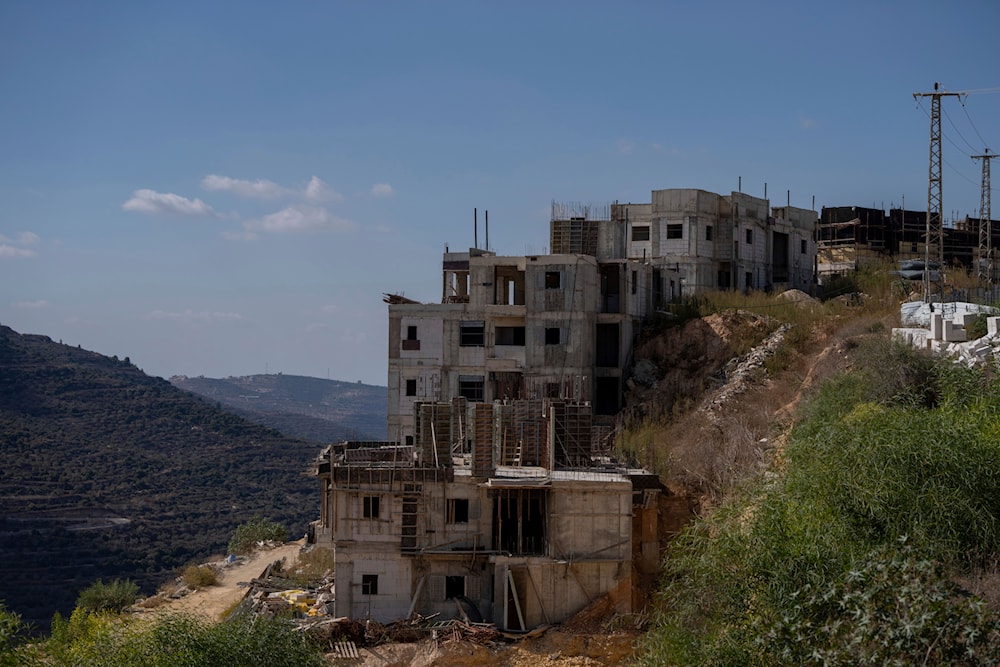Palestinians condemn 'Israel' approval of new West Bank settlements
The Israeli decision to recognize 13 neighborhoods as settlements in the West Bank was hailed by Israeli finance minister Bezalel Smotrich, who called an important step for illegal Israeli settlements.
-

A housing construction site is seen at the illegal settlement of Eli, West Bank, Occupied Palestine Monday, Nov. 11, 2024 (AP)
The Palestinian foreign ministry condemned an Israeli decision to recognize more than a dozen new illegal settlements, in a bid to boost efforts into annexing the West Bank.
The Palestinian foreign ministry condemned on Sunday an Israeli decision to recognize over a dozen new settlements in the occupied West Bank, upgrading existing neighborhoods to independent settlement status, expressing strong opposition to the move.
The 13 settlement neighborhoods that have been approved for development by the Israeli cabinet are spread across various areas of the West Bank, with some functioning as extensions of larger settlements while others exist as practically separate entities, each with its own unique characteristics and geographical positioning.
Although the cabinet has moved to recognize them as distinct communities under Israeli law, this recognition has not yet been finalized, leaving the process still incomplete and subject to further legal and administrative steps.
Israeli Finance Minister Bezalel Smotrich, a far-right leader and settler responsible for the cabinet's decision, hailed it as an "important step" for Israeli settlements in the West Bank, stating in a Telegram post that recognizing each neighborhood as a separate community would facilitate their development and describing the move as part of a "revolution."
"Instead of hiding and apologizing, we raise the flag, we build and we settle," Smotrich stated, adding, "This is another important step towards de facto sovereignty in Judea and Samaria." The far-right Israeli Finance Minister is a strong proponent of the formal annexation of the West Bank, as "Israel" did with East al-Quds.
The Israeli NGO Peace Now, which opposes settlements in the West Bank, condemned the decision to recognize 13 new ones, describing it as "another nail in the coffin" for the prospects of a "two-state solution" that envisions a Palestinian state alongside the Israeli occupation.
Israeli settlers and forces attack Palestinians in West Bank raids
Israeli settlers, backed by occupation forces, launched on March 18 attacks on Palestinians and their homes across the occupied West Bank.
According to the WAFA news agency, settlers, supported by Israeli soldiers, assaulted Palestinians in Wadi Hilweh, part of the East al-Quds neighborhood of Silwan.
Activist Aref Jaber also reported settler violence in al-Khalil’s Old City, specifically in the Jaber, as-Salaymeh, and Wadi Nasara districts.
During the attacks, 64-year-old Abdul Aziz al-Shantir sustained head injuries when settlers stormed his shop. In Wadi al-Hussein, east of al-Khalil, settlers hurled stones and empty bottles at Palestinian homes.
Meanwhile, Israeli forces raided the village of Nabi Saleh, northwest of Ramallah, opening fire on a parked vehicle.
Israeli occupation forces continued on Sunday their assault on the city of Tulkarm and its refugee camps in the occupied West Bank, raiding neighborhoods, setting fire to homes, and demolishing residential buildings in the Nur Shams refugee camp.
For the 48th consecutive day, Israeli forces stormed several areas of the Tulkarm refugee camp, forcibly expelling Palestinian residents from their homes as part of their ongoing military assault.
Meanwhile, occupation troops deployed additional reinforcements to Tulkarm, moving through the main streets while restricting the movement of Palestinian civilians and vehicles. Military vehicles and bulldozers were also seen in front of buildings seized by Israeli forces on Nablus Street, which have been turned into military outposts.
Simultaneously, Israeli troops opened fire on an ambulance heading toward the Nur Shams refugee camp to evacuate a patient, preventing it from reaching its destination.
More than 12,000 Palestinians have been forcibly displaced from Nur Shams so far, with another 12,000 displaced from the Tulkarm camp.
Israeli settlers use grazing to usurp West Bank land
In their study "The Bad Samaritan", published on March 21, Israeli NGOs Peace Now and Kerem Navot reported that over the preceding three years, 70% of the land seized by settlers had been "taken under the guise of grazing activities."
Settlers in the occupied West Bank utilize herding to establish a presence on agricultural grounds used by Palestinian populations, progressively denying them access to these areas, according to the research.
"Israeli authorities make living conditions very difficult, but settler violence is really the main trigger why people leave lately -- they have nothing to protect themselves," said Allegra Pacheco, head of the West Bank Protection Consortium, a consortium of international non-governmental organizations.

 4 Min Read
4 Min Read








